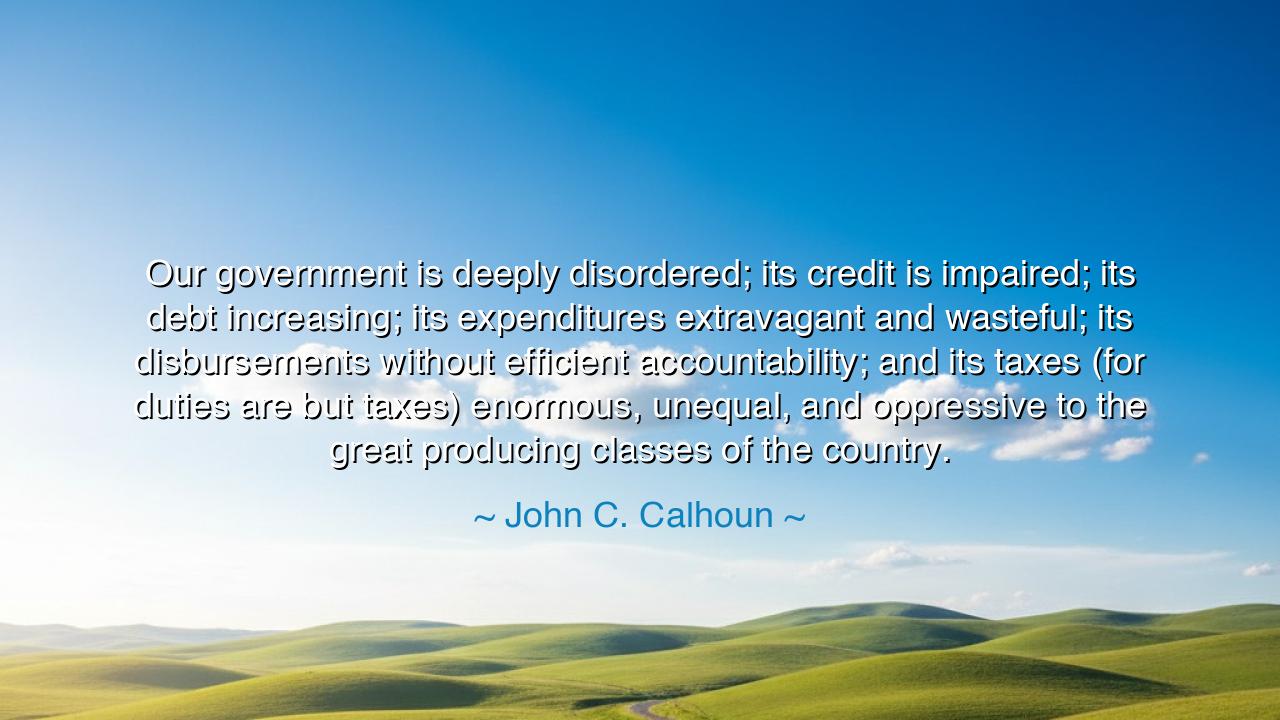
Our government is deeply disordered; its credit is impaired; its
Our government is deeply disordered; its credit is impaired; its debt increasing; its expenditures extravagant and wasteful; its disbursements without efficient accountability; and its taxes (for duties are but taxes) enormous, unequal, and oppressive to the great producing classes of the country.






When John C. Calhoun declared, “Our government is deeply disordered; its credit is impaired; its debt increasing; its expenditures extravagant and wasteful; its disbursements without efficient accountability; and its taxes (for duties are but taxes) enormous, unequal, and oppressive to the great producing classes of the country,” he spoke not merely as a statesman of his age, but as a prophet of all ages. His words ring with the fierce cadence of a man who had looked upon the machinery of government and found it swollen with arrogance and corruption. They were the cry of one who saw the republic drifting from its founding virtues — from frugality to waste, from balance to debt, from accountability to indulgence. In his lament, Calhoun was not condemning a single policy, but warning against the slow moral decay that begins when power forgets restraint.
The origin of this quote reaches back to the early 19th century, during the turbulent years following the War of 1812 and leading into the economic crises of the 1830s and 1840s. Calhoun, a Southern senator and once vice president of the United States, was among the most eloquent — and controversial — voices of his time. Though history remembers him for his defense of states’ rights and sectional interests, this quote comes from his broader criticism of federal excess and fiscal irresponsibility. He saw a government that had begun to spend without discipline, borrowing against the future, while imposing unequal taxes on those who worked the land and produced the wealth of the nation. In his eyes, the republic had ceased to serve its people and had begun to feed upon them.
In the style of the ancients, one might hear in Calhoun’s words the echo of a Roman senator lamenting the fall of the Republic — a Cato or a Cicero railing against the moral corruption of power. For history’s pattern is clear: when a state’s coffers overflow with debt and its leaders lose the habit of thrift, decline is not far behind. Rome, once strong and disciplined, grew decadent as its expenditures outpaced its revenues. Public funds were squandered on spectacle and luxury, while taxes rose upon the shoulders of farmers and craftsmen. The government, meant to serve the citizen, became his master. And just as Rome’s strength was consumed by its excess, so too did Calhoun fear that America, young and proud, might follow the same fatal course.
His imagery — “extravagant expenditures” and “oppressive taxes” — speaks to a deeper truth than mere economics. It is the moral law of balance. When those who govern live beyond their means, they teach the governed to do the same. When leaders cease to hold themselves accountable, corruption becomes not the exception but the rule. Calhoun’s warning is not only about money — it is about the integrity of a nation’s soul. A society that trades prudence for comfort, discipline for indulgence, will in time find itself both morally and financially bankrupt. Government debt, in his eyes, was not just a fiscal burden; it was a symptom of spiritual disorder.
History has proven him right more times than one would wish. In every century, nations that have ignored the limits of economy and virtue have paid dearly. Consider the tragedy of France before the Revolution. The royal court at Versailles dazzled the world with opulence while the common people starved. The state’s debt ballooned, its taxes crushed the peasantry, and accountability vanished behind silk curtains and powdered wigs. The grandeur of kings could not protect them from the justice of reality — for when the burdens of the many sustain the excess of the few, rebellion becomes inevitable. In that same mirror, Calhoun saw a warning for America: that no republic, however mighty, can survive long when its government grows fat on the labor of its citizens.
And yet, within his lament lies not despair but a call to virtue. Calhoun’s words urge every generation to remember that liberty requires discipline — that freedom cannot flourish when government spends without thought, borrows without shame, and taxes without fairness. The “great producing classes,” those who build, farm, and labor, are the heartbeat of any nation; when their burdens grow unbearable, the entire body of the republic weakens. Thus, Calhoun speaks to the eternal duty of both rulers and citizens: to demand accountability, to resist extravagance, and to defend the moral balance between service and power.
The lesson of John C. Calhoun’s words is therefore as alive today as it was in his century: a disordered government reflects a disordered people. When citizens cease to demand virtue from their leaders, when they ignore waste, when they accept corruption as inevitable, they become accomplices in their own decline. The remedy lies not in anger, but in renewal — in the courage to restore integrity where it has been lost.
So let these words stand as a torch for future generations: guard the treasury as you would guard your freedom. Demand transparency. Celebrate prudence. Honor work, not waste. For when a nation’s rulers remember that the wealth of the people is sacred, when they spend with care and govern with humility, then the republic lives on — not as an empire of debt, but as a commonwealth of virtue. And in that discipline lies the true strength of a free and enduring people.






AAdministratorAdministrator
Welcome, honored guests. Please leave a comment, we will respond soon